US and India expand cooperation in human spaceflight
- June 18, 2024
- 0
The U.S. and Indian governments announced June 17 that they are advancing cooperation on human spaceflight to include the flight of an Indian astronaut to the International Space
The U.S. and Indian governments announced June 17 that they are advancing cooperation on human spaceflight to include the flight of an Indian astronaut to the International Space

The U.S. and Indian governments announced June 17 that they are advancing cooperation on human spaceflight to include the flight of an Indian astronaut to the International Space Station, although there are few details about who will fly when.
The White House published an information bulletin regarding the US-India Initiative for Critical and Emerging Technologies (iCET) meeting, which took place in New Delhi on June 17 and was chaired by the national security advisors of the two countries. The statement emphasized the progress made by the two countries in cooperation in various technological sectors.
The news release praised “the provision of a vehicle for the first joint effort by NASA and ISRO astronauts on the International Space Station” in space. This appeared to be a reference to last June’s announcement that the US would train Indian astronauts “for a joint effort with the International Space Station in 2024.”
The memo does not reveal who the carrier for the mission will be or when the mission will fly. US Ambassador to India Eric Garcetti said in May that the mission would take place this year. But a NASA spokesman said the details of the flight were still being worked out and only then would NASA “determine the mission timing and required training modules” for such a mission.
The most likely scenario for an Indian astronaut to fly to the ISS would be a special mission in which the astronaut would spend up to two weeks on the station. The next mission is Ax-4 Axiom Space, scheduled for later this year, but the company has not announced the mission’s crew or training plans.
The news release said the two countries had developed a “Strategic Framework for Cooperation in Human Spaceflight” but did not disclose details of the document. In the joint statement made last year, it was stated that the structure would be completed by the end of 2023. They also said they would “work to begin training ISRO astronauts at NASA’s Johnson Space Center.”
The countries are also exploring “opportunities for India’s participation in the Lunar Gateway programme, as well as common avenues for cooperation in other space technologies.” The NASA-led lunar gateway currently includes Western partners on the ISS as well as the United Arab Emirates, which agreed in January to develop the gateway module.
In the statement, India and the USA emphasized cooperation in space. India took part as an observer in the Global Sentinel space security exercise conducted by the US Space Command in February and will participate in the exercise next year. The two countries also discussed space defense cooperation, which included a space tabletop exercise, at the Advanced Space Defense Dialogue held in May. Two Indian startups, 114ai and 3rdiTech, are collaborating with the US Space Force on space situational awareness technologies.
NASA and Indian space agency ISRO have been collaborating on the NASA-ISRO Synthetic Aperture Science Mission (NISAR) for several years, according to a fact sheet. NISAR was planned to be launched on India’s GSLV rocket earlier this year but was delayed to modify its large delivery antenna to protect it from higher-than-expected temperatures when folded. Neither the agency nor the White House fact sheet announced a new launch date for NISAR.
Source: Port Altele
As an experienced journalist and author, Mary has been reporting on the latest news and trends for over 5 years. With a passion for uncovering the stories behind the headlines, Mary has earned a reputation as a trusted voice in the world of journalism. Her writing style is insightful, engaging and thought-provoking, as she takes a deep dive into the most pressing issues of our time.